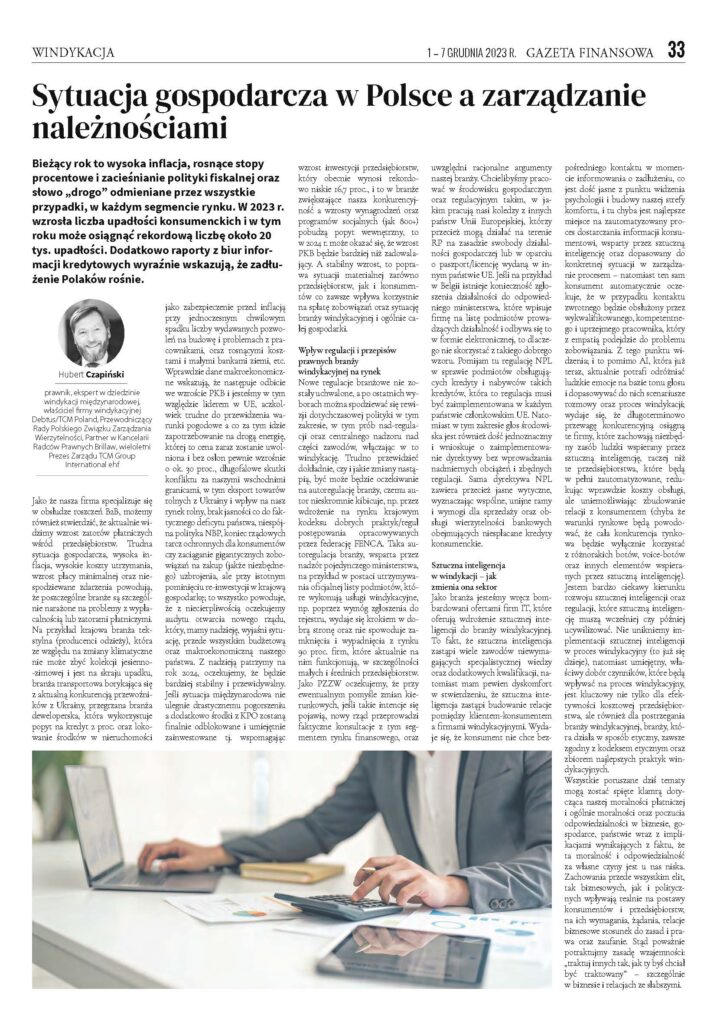Debt Collection Management Amidst Poland’s Economic Landscape
Congratulations to Mr. Hubert Czapiński, an esteemed debt collection expert on Expert Planet, for the recent publication of his article in the latest edition of the Financial Gazette! The article delves into the current economic landscape in Poland, offering insightful predictions for 2024, discussing the latest industry legislations, and exploring the impact of AI on debt collection management processes. The article was orginally published in Polish, and we now present the English version for your reference. We hope you enjoy reading and gain a comprehensive understanding of debt collection in Poland.

• The economic situation in Poland and receivables management
This year means high inflation, rising interest rates, and tightening fiscal policy, as well as the word ‘expensive’ used in all cases, in every market segment. In 2023 the number of consumer bankruptcies has increased and this year may reach a record number of approximately 20,000 bankruptcies, in addition, reports from credit information offices clearly indicate that the debt of Poles is growing. As our company specializes in handling B2B claims, we can also say that we are currently seeing an increase in payment backlogs among enterprises. The difficult economic situation, high inflation, high costs of living, an increase in the minimum wage and unexpected events make individual industries particularly vulnerable to solvency problems or payment backlogs. For example, the domestic textile industry (clothing manufacturers), which due to climate change cannot sell the autumn-winter collection and is on the verge of collapse, the transport industry struggling with the current competition from carriers from Ukraine, the overheated development industry that takes advantage of the demand for credit 2 % and investing funds in real estate as a hedge against inflation with a simultaneous temporary decline in the number of building permits issued and problems with employees, rising costs and small land banks, etc. Although macroeconomic data indicate that there is a rebound in GDP growth and we are the leader in the EU in this respect, weather conditions are difficult to predict and, consequently, the demand for expensive energy, the price of which will soon be released and will probably increase by about 30 %, the long-term effects of the conflict beyond our eastern borders, including the export of agricultural goods from Ukraine and the impact on our agricultural market, the lack of clarity as to the actual state deficit, the inconsistent policy of the National Bank of Poland, the end of government protective shields for consumers or incurring huge liabilities for purchases (how necessary) armament, but with the significant omission of re-investment in the domestic economy; All this means that we are eagerly awaiting the audit of the opening of the new government, which we hope will clarify the situation, especially the budgetary and macroeconomic situation of our country. We look to 2024 with hope and expect it to be more stable and predictable. If the international situation does not deteriorate dramatically, in addition, funds from the KPO will be finally released and skillfully invested, i.e. supporting the growth of enterprise investment, which is currently at a record low of 16.7%, and in industries that increase our competitiveness and increases wages and social programs (such as 800+) will stimulate internal demand, then in 2024 it may turn out that GDP growth will be more than satisfactory. Stable growth means an improvement in the financial situation of both enterprises and consumers, which always has a positive effect on the repayment of liabilities and the situation of the debt collection industry and the entire economy in general.

• The impact of regulations and legal provisions of the debt collection industry on the market
New industry regulations have not been adopted, and after the last elections, we can expect a revision of the current policy in this area, including attempts at over-regulation and central supervision of some professions, including debt collection. It is difficult to predict exactly whether and what changes will occur, perhaps there will be a wait for the industry’s self-regulation, which the author unabashedly supports, e.g. by implementing the code of good practice/rules of conduct developed by the FENCA federation on the domestic market. Such self-regulation of the industry, supported by the supervision of a single ministry, for example in the form of maintaining an official list of entities that provide debt collection services, e.g. by requiring registration in the register, seems to be a step in the right direction and will not result in the closure and going out of business of 90% of companies, that currently operate there, in particular small and medium-sized enterprises. As PZZW, we expect that when considering any directional changes, if such intentions arise, the new government will conduct actual consultations with this segment of the financial market and take into account the rational arguments of our industry. We would like to work in an economic and regulatory environment such as that of our colleagues from other European Union countries, who can operate in the Republic of Poland based on freedom of business activity or based on a passport/license issued in another EU country. If, for example, in Belgium it is necessary to register a business activity with the relevant ministry, which enters the company on the list of entities conducting business activity and this is done in electronic form, why not use such a good template. I am leaving out the NPL regulation on loan servicers and buyers of such loans, which must be implemented in every EU member state. However, in this respect, the voice of the environment is also quite clear and calls for the implementation of the directive without introducing excessive burdens and unnecessary regulations. The NPL Directive itself contains clear guidelines, setting a common EU framework and requirements for the sale and servicing of bank receivables including unpaid consumer loans.

• Artificial intelligence in debt collection – how it is changing the sector
As an industry, we are bombarded with offers from IT companies that offer to implement artificial intelligence in the debt collection industry. It is a fact that artificial intelligence will replace many professions that do not require specialized knowledge and additional qualifications, but I am somewhat uncomfortable with the statement that artificial intelligence will replace building relationships between client-consumer and debt collection companies. It seems that the consumer does not want direct contact when informing about debt, which is quite clear from the point of view of psychology and building our comfort zone, and this is probably the best place for an automated process of providing information to the consumer, supported by artificial intelligence and tailored to a specific situation in process management – however, the same consumer automatically expects that in the event of return contact, he will be served by a qualified, competent and polite employee who will approach the problem of the obligation with empathy. From that point of view; and despite AI, which can now distinguish human emotions based on the tone of voice and match conversation scenarios and the debt collection process to them; it seems that in the long term, the competitive advantage will be achieved by those companies that retain the necessary human resources supported by artificial intelligence, rather than those that will be fully automated, reducing service costs but making it impossible to build a relationship with the consumer (unless market conditions cause that all market competition will exclusively use various bots, voice-bots and other elements supported by artificial intelligence). I am very curious about the direction of the development of artificial intelligence and the regulations that must civilize artificial intelligence sooner or later. We will not avoid the implementation of artificial intelligence in the debt collection process (it is already happening), but the skillful and appropriate selection of factors that will influence the debt collection process is crucial not only for the company’s cost efficiency but also for the perception of the debt collection industry, an industry that operates in an ethical, always consistent with the code of ethics and the set of best debt collection practices.
All the topics discussed today can be linked to our payment morality and generally our morality and sense of responsibility in business, the economy, and the state, with implications resulting from the fact that we have low morality and responsibility for our actions. The behavior of elites, both business and political, has a real impact on the attitudes of consumers and enterprises, on their requirements, demands, business relations, attitudes towards rules and law, and trust. Hence, let’s take the principle of reciprocity seriously: “Treat others the way you would like to be treated” – especially in business and relationships with the weaker.






